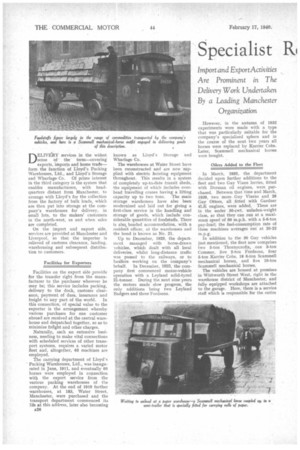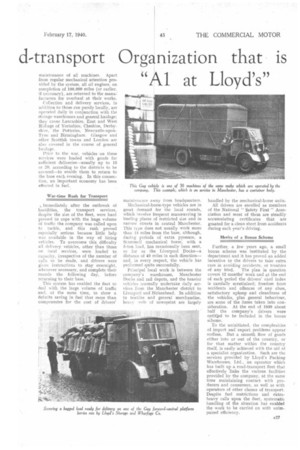Specialist RI d-tran sport Organization that is "Al at Lloyd's"
Page 36

Page 37

If you've noticed an error in this article please click here to report it so we can fix it.
Import and ExportActivities Are Prominent in The Delivery Work Undertaken By a Leading Manchester
Organization
DELIVEIZY services in the widest sense of the term—covering exports, imports and home trade— form the function of Lloyd's Packing Warehouses, Ltd., and Lloyd's Storage and Wharfage. Co. Of prime interest in the third category is the system that enables manufacturers, with headquarters distant from Manchester, to arrange with Lloyd's for the collection from the factory of bulk loads, which are then put into storage at the company's warehouses for delivery, in small lots, to the makers' customers in the north-west, as and when sales are completed.
On the import and export side, services are provided at Manchester and Liverpool, so that the importer is relieved of customs clearance, landing, warehousing and subsequent distribution to customers.
Facilities for Exporters Facilities on the export side ,provide for the transfer right from the manufacturer to the purchaser wherever he may be; this service includes packing, delivery to the dock, customs clearance, payment of dues, insurance and freight to any part of the world. In this connection, of special value to the exporter is the arrangement whereby various purchases for one customer abroad are received at the central warehouse and despatched together, so as to minimize frdight and other charges.
Naturally, such an extensive business, needing to make vital connections with scheduled services of other transport systems, requires a varied motor fleet and, altogether, 65 machines are employed.
The carrying department of Lloyd's Packing Warehouses, Ltd., was inaugurated in June, 1911, and eventually 60 horses were employed in connection with the export service from the various packing warehouses of the company. At the end of 1919 further warehouses, at 183, Water Street, Manchester, were purchased and the transport department commenced its life at this address, later also becoming a26 known as Lloyd's Storage and Wharfage Co.
The warehouses at Water Street have been reconstructed and are now supplied with electric hoisting equipment throughout. This results in a system of completely up-to-date transit sheds, the equipment of which includes overhead travelling cranes having a lifting capacity up to two tons. The main storage warehouses have also been modernized and laid out for giving a first-class service in the handling and storage of goods, which include considerable quantities of foodstuffs. There is also, bonded accommodation, with a resident officer, at the warehouses and the bond is known as No. 21.
Up to December, 1923, the department managed with horse-drawn vehicles, which dealt with all local deliveries, whilst long-distance traffic was passed to the railways, or to hauliers working on the company's behalf. In December, 1923, the company first commenced motor-vehicle operation with a Leyland solid-tyred 21-tonner. During the next nine years the motors made slow progress, the only additions being two Leyland Badgers and three Fordsons. However, in the autumn of 1932 experiments were made with a type that was particularly suitable for the company's specialized sphere and in the course of the next two years all horses were replaced by Karrier Cobs. Later, Scammell mechanical horses were bought.
Oilers Added to the Fleet In March, 1935, the department decided upon further additions to the fleet and two Guy Vixen lorries, fitted with Dorman oil engines, were purchased. Between that time and March, 1939, two more Guy Vixens and 26 Guy Otters, all fitted with Gardner 4LK engines, were added. These are in the under 50-cwt. unladen-weight class, so that they can run at a maximum speed of 30 m.p.h. with a 5-6-ton pay-load; the fuel-consumption rate of these machines averages out at 20-22 m.p.g. In addition to the 30 Guy vehicles just mentioned, the fleet now comprises two 5-ton Thornycrofts, one 3-ton Cornmer, five 2-ton Fordsons, four 5-ton Karrier Cobs, 18 6-ton Scammell mechanical horses, and five 10-ton Scammell mechanical horses.
The vehicles are housed at premises in Whitworth Street West, right in the warehouse district of Manchester, and fully equipped workshops are attached to the garage. Here, there is a service staff which is responsible for the entire maintenance of all machines. Apart from regular mechanical attention provided by the system, all oil engines, on completion of 100,000 miles (or earlier, if necessary), are returned to the manufacturers for overhaul at their works.
Collection and delivery services, in addition to those run purely locally, are operated daily in conjunction with the storage warehouses and general haulage; they cover Lancashire, East and West Ridings of Yorkshire, Cheshire, Derbyshire, the Potteries, Newcastle-uponTyne and Birmingham. Glasgow and other Scottish towns and London arc also covered in the course of general haulage.
Prior to the war, vehicles on these services were loaded with goods for sufficient deliveries—usually up to 15 or 20, according to the districts to he covered—to enable them to return to the base each evening. In this connection, an important economy has been effected in fuel.
War-time Rush for Transport „ Immediately after the outbreak of hostilities, the transport services, despite the size of the fleet, were hard pressed to cope with the huge volume of traffic the company was called upon to tackle, and this rush proved especially serious because little help was available in the way of hiring vehicles. To overcome this difficulty all delivery vehicles, other than those on local services, were loaded to capacity, irrespective of the number of calls to be made, and drivers were given instructions to stay overnight, whenever necessary, and complete their rounds the following day, before returning to their base.
This system has enabled the fleet to deal with the large volume of traffic and, at the same time, to show a definite saving in fuel that mote than compensates for the cost of drivers' maintenance away from headquarters.
Mechanical-horse-type vehicles are in great demand for the local rounds, which involve frequent manceuvring in loading places of restricted size and in narrow streets in central Manchester. This type does not usually work more than 15 miles from the base, although, during periods of extra pressure, a Sc.ammeIl mechanical horse, with a 5-ton load, has occasionally been sent, so far as the Liverpool Docks—a distance of 40 miles in each direction— and, in every respect, the vehicle has performed quite successfully.
Principal local work is between the company's warehouses, Manchester Docks and rail depots, and the heavier vehicles normally undertake daily services from the Manchester district to Liverpool and Birkenhead. In addition to textiles and general merchandise, heavy reels of newsprint are largely handled by the mechanical-horse units.
All drivers are enrolled as members of the National " Safety First" Association and most of them are steadily accumulating certificates that are granted for a clean sheet front accidents during each year's driving.
Merits of a Bonus Scheme Further, a few years ago, a small bonus scheme was instituted by the department and it has proved an added incentive to the drivers to take extra care in avoiding accidents, or troubles of any kind. The plan in question covers 12 months' work and at the end of each period the drivers' card index is carefully scrutinized; freedom from accidents and offences of any class, satisfactory upkeep and cleanliness of the vehicles, plus general behaviour, are some of the items taken into consideration, At the end of 1939 about half the company's drivers were entitled to be included in the bonus scheme.
To the uninitiated, the complexities of import and export problems appear endless. But a smooth flow of goods either into or out of the country, or for that matter within the country itself, is easily achieved with the aid of a specialist organization. Such are the services provided by Lloyd's Packing Warehouses, Ltd., an operator which has built up a road-transport fleet that effectively links the various facilities provided by the company, at the same time maintaining contact with producers and consumers, as well as with operators of other classes of transport. Despite fuel restrictions and extraheavy calls upon the fleet, systematic handling of the situation has enabled the work to be carried on with unimpaired efficiency.




























































